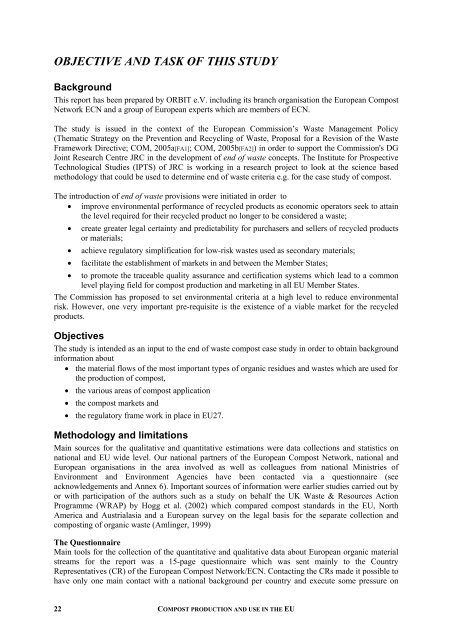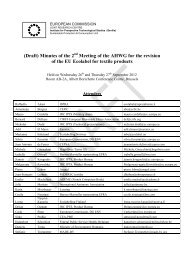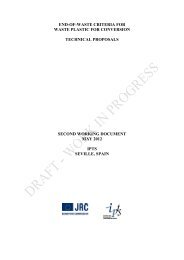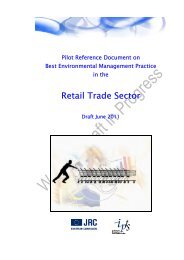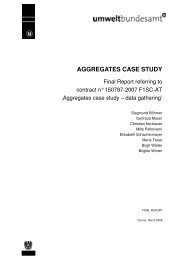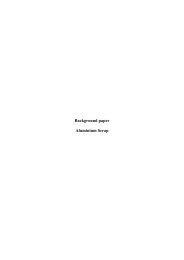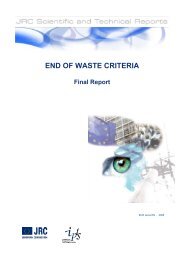final report - JRC IPTS - Sustainable Production and Consumption ...
final report - JRC IPTS - Sustainable Production and Consumption ...
final report - JRC IPTS - Sustainable Production and Consumption ...
You also want an ePaper? Increase the reach of your titles
YUMPU automatically turns print PDFs into web optimized ePapers that Google loves.
OBJECTIVE AND TASK OF THIS STUDY<br />
Background<br />
This <strong>report</strong> has been prepared by ORBIT e.V. including its branch organisation the European Compost<br />
Network ECN <strong>and</strong> a group of European experts which are members of ECN.<br />
The study is issued in the context of the European Commission’s Waste Management Policy<br />
(Thematic Strategy on the Prevention <strong>and</strong> Recycling of Waste, Proposal for a Revision of the Waste<br />
Framework Directive; COM, 2005a[FA1]; COM, 2005b[FA2]) in order to support the Commission's DG<br />
Joint Research Centre <strong>JRC</strong> in the development of end of waste concepts. The Institute for Prospective<br />
Technological Studies (<strong>IPTS</strong>) of <strong>JRC</strong> is working in a research project to look at the science based<br />
methodology that could be used to determine end of waste criteria e.g. for the case study of compost.<br />
The introduction of end of waste provisions were initiated in order to<br />
• improve environmental performance of recycled products as economic operators seek to attain<br />
the level required for their recycled product no longer to be considered a waste;<br />
• create greater legal certainty <strong>and</strong> predictability for purchasers <strong>and</strong> sellers of recycled products<br />
or materials;<br />
• achieve regulatory simplification for low-risk wastes used as secondary materials;<br />
• facilitate the establishment of markets in <strong>and</strong> between the Member States;<br />
• to promote the traceable quality assurance <strong>and</strong> certification systems which lead to a common<br />
level playing field for compost production <strong>and</strong> marketing in all EU Member States.<br />
The Commission has proposed to set environmental criteria at a high level to reduce environmental<br />
risk. However, one very important pre-requisite is the existence of a viable market for the recycled<br />
products.<br />
Objectives<br />
The study is intended as an input to the end of waste compost case study in order to obtain background<br />
information about<br />
• the material flows of the most important types of organic residues <strong>and</strong> wastes which are used for<br />
the production of compost,<br />
• the various areas of compost application<br />
• the compost markets <strong>and</strong><br />
• the regulatory frame work in place in EU27.<br />
Methodology <strong>and</strong> limitations<br />
Main sources for the qualitative <strong>and</strong> quantitative estimations were data collections <strong>and</strong> statistics on<br />
national <strong>and</strong> EU wide level. Our national partners of the European Compost Network, national <strong>and</strong><br />
European organisations in the area involved as well as colleagues from national Ministries of<br />
Environment <strong>and</strong> Environment Agencies have been contacted via a questionnaire (see<br />
acknowledgements <strong>and</strong> Annex 6). Important sources of information were earlier studies carried out by<br />
or with participation of the authors such as a study on behalf the UK Waste & Resources Action<br />
Programme (WRAP) by Hogg et al. (2002) which compared compost st<strong>and</strong>ards in the EU, North<br />
America <strong>and</strong> Austrialasia <strong>and</strong> a European survey on the legal basis for the separate collection <strong>and</strong><br />
composting of organic waste (Amlinger, 1999)<br />
The Questionnaire<br />
Main tools for the collection of the quantitative <strong>and</strong> qualitative data about European organic material<br />
streams for the <strong>report</strong> was a 15-page questionnaire which was sent mainly to the Country<br />
Representatives (CR) of the European Compost Network/ECN. Contacting the CRs made it possible to<br />
have only one main contact with a national background per country <strong>and</strong> execute some pressure on<br />
22<br />
COMPOST PRODUCTION AND USE IN THE EU


